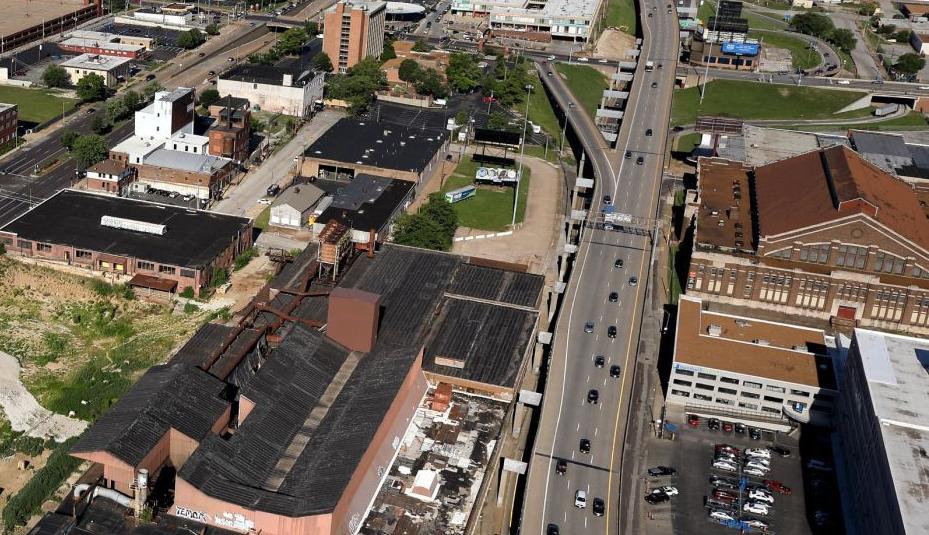ST. LOUIS ŌĆö Two largely procedural ├█č┐┤½├Į Board of Aldermen bills related to Green Street ├█č┐┤½├ĮŌĆÖ Armory development would have, in another era, entered their legislative existence unremarked.
But the bills introduced Friday drew attention not so much for what was in them but for who introduced them.
ŌĆ£I was surprised to see that board bill on the agenda,ŌĆØ said Alderman Tina Pihl, whose 17th Ward includes the 1930s Armory building Green Street has been working for years to redevelop. ŌĆ£This caught me by surprise.ŌĆØ
The legislation, which extends the deadline in Green StreetŌĆÖs development agreement with the city and lets them tap some development tax breaks aldermen authorized years ago, was introduced by Alderman Marlene Davis, whose 19th Ward is just to the east of the Armory.
DavisŌĆÖ introduction of the bills affecting a project in another ward represents a break with the cityŌĆÖs long tradition of ŌĆ£aldermanic courtesy,ŌĆØ where aldermen control legislation for projects in their wards.
People are also reading…
ItŌĆÖs also another example of a developer hoping to build within the desirable Central West End and Grove areas of the 17th Ward unable to reach a deal with Pihl. Cortex, the nonprofit tech district made up of some of the cityŌĆÖs largest institutions such as Washington University and BJC HealthCare, has also said itŌĆÖs been unable to broker a deal with Pihl to extend a development incentives package the city granted to it a decade ago.
ŌĆ£Maybe we need to push back on aldermanic courtesy,ŌĆØ Davis said Friday. ŌĆ£WeŌĆÖve held (the Armory) up for almost a year.ŌĆØ
Whether the move amounts to a crack in the old city tradition of aldermanic courtesy or is just a one-time maneuver around an impasse with Pihl remains to be seen. Regardless, it hasnŌĆÖt been tried in years.
ŌĆ£Historically, that would be viewed as a pretty aggressive move,ŌĆØ said former Alderman Joe Roddy, who chaired the development-centric Housing, Urban Development and Zoning committee and represented the 17th Ward for over 30 years before Pihl was elected in 2021. ŌĆ£ItŌĆÖs very unusual.ŌĆØ
ItŌĆÖs not completely unprecedented. Former Board President Lewis Reed handled bills related to the new Major League Soccer stadium, rather than Alderman Christine Ingrassia whose ward it was in. And in the mid 1990s, Freeman Bosley Jr.ŌĆÖs administration went around Alderman Sharon Tyus when she wouldnŌĆÖt agree to bills allowing Schnucks to build a store on Natural Bridge Avenue.
ŌĆ£I would think this would be an indication that the administration has recognized that the project needs incentives, and thereŌĆÖs probably a break with the alderperson at this point,ŌĆØ Roddy said.
The ├█č┐┤½├Į Development Corp., which vets and negotiates development incentives, has broken with Pihl before. In June, it moved ahead with a project subsidy ŌĆö also for Green Street ŌĆö despite PihlŌĆÖs protests.
An SLDC spokeswoman pointed out the Armory bills donŌĆÖt change the scope of the incentive package agreed to five years ago and that the legislation was ŌĆ£time-sensitiveŌĆØ because of a deadline that had passed in the 2017 development agreement.
ŌĆ£One aldermanŌĆÖs approval should not be the sole determinant for a development project to move forward,ŌĆØ SLDC spokesman Sara Freetly said in a statement responding to questions sent to her and SLDC Director Neal Richardson. ŌĆ£It should be considered by the full Board of Aldermen.ŌĆØ
Aldermen in 2017 approved a tax increment financing package worth up to $10.4 million for the redevelopment of the historic Armory building, including $4.7 million for the first phase. Green Street has had trouble getting the project going and was forced to drop plans for office space during the pandemic. But now it plans to open a recreation venue there by the end of the year and needs legislation authorizing the TIF incentives for the first phase.
A spokeswoman for Green Street declined to comment.
Pihl was elected last year on a platform that included taking a tougher stance on developer incentives. The message was similar to that from Mayor Tishaura O. Jones, who was elected at the same time and whose administration initially worked with Pihl to renegotiate some development agreements.
Green Street, SLDC and Pihl were finalizing a package that included a developer contribution of $470,000 to city schools or affordable housing as part of an agreement to move legislation forward, Pihl said. But she conceded it had been a ŌĆ£couple monthsŌĆØ since she last discussed the agreement with SLDC or the developer.
Pihl said she received no notification from Richardson, SLDC or the mayorŌĆÖs office that Davis would be introducing the bills, which donŌĆÖt include the contributions to public schools or affordable housing.
ŌĆ£ThatŌĆÖs not economic justice,ŌĆØ Pihl said. ŌĆ£ThatŌĆÖs not equity for the city. ... It just disenfranchises the voters.ŌĆØ
SLDCŌĆÖs statement said that ŌĆ£community benefits can take many shapes and forms.ŌĆØ
ŌĆ£SLDC has and will continue to negotiate with developers, including Green Street, to require, structure and document community benefit agreements in the manner most appropriate for each project,ŌĆØ the agency said.
Davis noted that part of the Armory development area is in her ward, and she has co-sponsored past Armory legislation with Roddy. In any case, Davis said aldermen should be willing to listen to the ŌĆ£experts at SLDC,ŌĆØ who professionally vet development projects.
The federal indictment in June of three aldermen for using aldermanic courtesy and official letters of support to solicit bribes in exchange for development incentives has also prompted a rethinking of aldermanic involvement in development, Davis said. Legislation under review at the board now may make some of those changes, she suggested.
ŌĆ£Maybe sometimes (SLDC) wonŌĆÖt even ask an alderman for a letter of support,ŌĆØ Davis said. ŌĆ£And if you think about it, maybe thatŌĆÖs OK.ŌĆØ
Editor's note:┬ĀThis article has been updated to clarify that Pihl said she did not receive notice from Davis that she would be introducing the bills.┬Ā






















